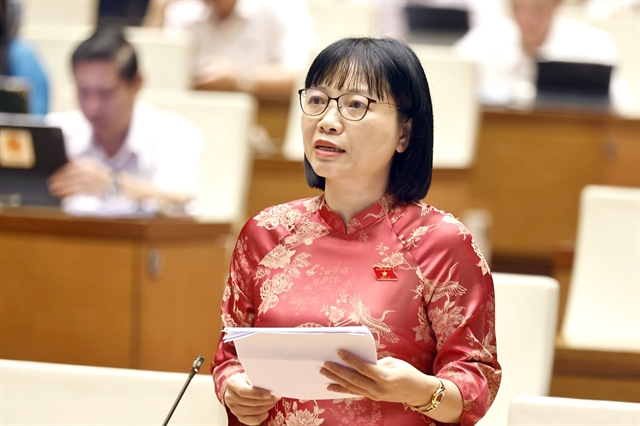.jfif) Opinion
Opinion

 |
| National Assembly deputy Nguyễn Thị Việt Nga. — VNA/VNS Photo Doãn Tấn |
Resolution 71-NQ/TW, the Politburo’s bold push to transform education and training, has sparked strong public interest and support. VietnamPlus caught up with National Assembly deputy Nguyễn Thị Việt Nga, a member of the NA Committee for Culture and Education, to discuss the significance of this strategic roadmap.
What is the significance of Resolution 71-NQ/TW for the development of Vietnamese education and the country as a whole, in the context that the nation enters a new era of growth?
Resolution 71-NQ/TW of the Politburo is a particularly significant milestone, reflecting the strategic vision of our Party for education and training. In the context of the nation entering a new era of development, with a strong aspiration for progress, this resolution identifies education as a 'top national policy,' considering it one of the key drivers of rapid and sustainable growth.
The greatest significance of Resolution 71-NQ/TW is that it underlines the decisive role of education in forming high-quality human resources, providing the knowledge, skills and value foundation for Việt Nam to realise its development aspirations and stand alongside the great powers of the world.
In your opinion, what are the current bottlenecks in Vietnamese education and how are they addressed in this resolution?
In recent years, Vietnamese education has achieved many accomplishments, but several bottlenecks remain.
First is the gap in educational quality between regions. Second, the curriculum and textbooks remain overly academic and somewhat detached from real life. Third, support for teachers remains inadequate and fails to encourage long-term dedication. Fourth is limited investment in facilities, especially in remote and disadvantaged areas.
Resolution No. 71-NQ/TW provides the fundamental solutions to remove these bottlenecks, such as implementing policies on universal tuition waivers and full-day schooling. It also prioritises investment in boarding and semi-boarding schools in border and disadvantaged regions, and fundamentally reforms the curriculum and textbooks to ensure that they are up to date, logical and relevant to reality.
These are strong, timely decisions designed to clear bottlenecks and create breakthroughs in education.
From your perspective, what are the breakthroughs in Resolution No 71-NQ/TW and how will they impact the development of Vietnamese education?
Resolution No. 71-NQ/TW contains many breakthrough elements. I would highlight three points:
First, education is positioned within the overall national development strategy, directly linked to the requirements of industrialisation, modernisation and international integration.
Second, a single nationwide set of textbooks will be applied, alongside a new mechanism for localities to add customised content. This both ensures uniformity and allows flexibility.
Third, priority will focus on unprecedented policies such as tuition-free general education, full-day schooling, and the development of high-quality schools in border and island regions.
These breakthroughs will create a fundamental change to ensure equity in access to education, while simultaneously improving training quality to help Vietnamese youth be fully prepared for the new era.
 |
| A student in Hà Nội buys textbook for the new school year. — VNA/VNS Photo Thanh Tùng |
What challenges do you foresee in implementing Resolution No 71-NQ/TW and how can we overcome them?
The greatest challenge is resources – ensuring adequate funding, facilities and teaching staff capable of meeting the very high requirements set out in the resolution. Additionally, the social attitudes and adaptability of parents, students and teachers towards changes also present a significant obstacle.
To realise this resolution, I believe three core solutions are needed. The first is a clear plan to mobilise and allocate financial resources effectively, avoiding waste and dispersion.
The second is improving the quality of teachers, and reforming salary and benefit policies so they can work with dedication and peace of mind.
The third is strengthening oversight and social feedback to ensure all policies are implemented transparently, consistently and effectively.
One of the concerns among the public is that Resolution No 71-NQ/TW stipulates ‘a single nationwide set of textbooks.’ Does this mean the policy of ‘one curriculum, multiple textbooks’ that has been in place in recent years has failed?
I do not think the ‘single nationwide set of textbooks’ should be seen as the ‘failure’ of the previous policy. In reality, we have gained valuable learning points after some time implementing the policy of ‘one curriculum, multiple textbooks.’ However, the model also revealed several shortcomings, particularly disparities and a lack of consistency in pedagogical practice.
Resolution No. 71-NQ/TW offers the solution of a ‘single nationwide set of textbooks’ to address these issues, while still ensuring flexibility through open sections allowing localities and schools to add customised content. In other words, this is not a negation, but rather a continuation and adjustment to make the textbook model more appropriate to today’s realities and development needs.
The Party and State have introduced many policies described as ‘unprecedented’ for education. Minister of Education and Training Nguyễn Kim Sơn also urged leveraging the current high attention on the education sector into opportunity for growth. What should the education sector do to seize this opportunity?
I fully agree with the minister’s assessment. Indeed, education has never received such comprehensive and strong attention as it does today and this is a great opportunity for Vietnamese education to break through. If we fail to seize it, as the minister said, we will be at fault to the nation and to future generations.
So what must the education sector do? In my view, it must focus on quality – quality of the curriculum and textbooks, ensuring logic, modernity and real-life relevance.
This also means the quality of the teaching workforce so that teachers truly become the ‘core’ of reform and quality of education governance – meaning transparency, efficiency, overcoming the achievement-driven mentality and, above all, putting students at the centre.
When these aspects of quality are ensured, we will be able to seize the opportunity that the Party, State and the people are providing and raise Vietnamese education to a new level. — VNS




